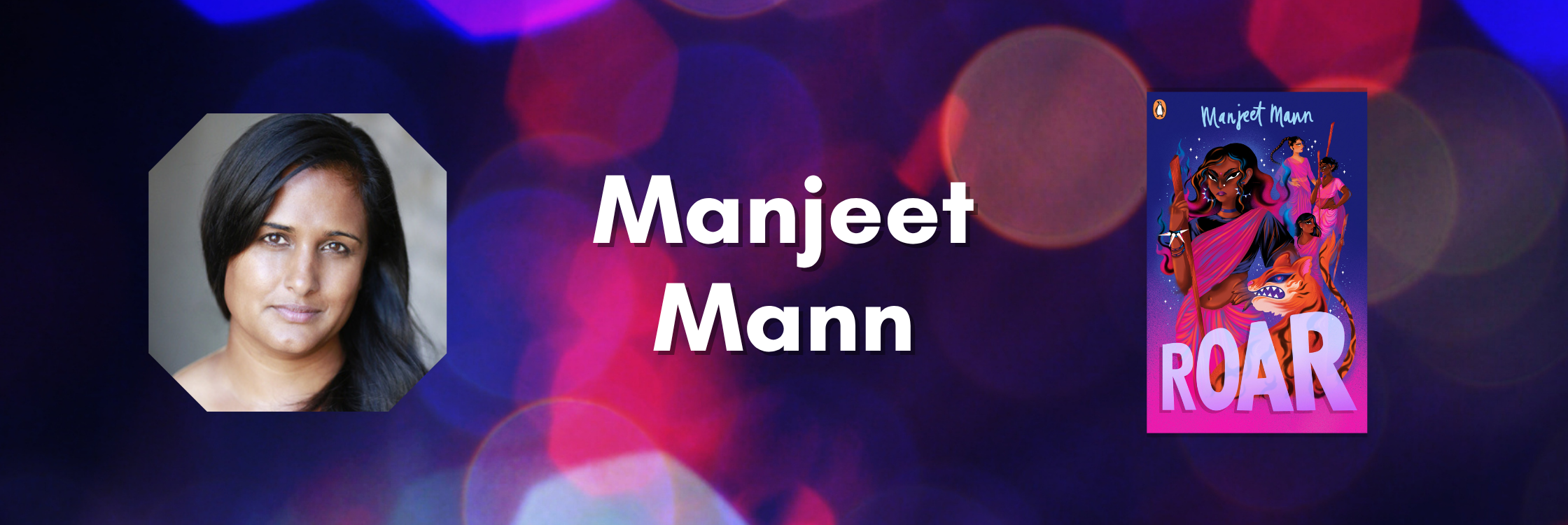In our Campfire Chats we talk to some wonderful authors about their books, life and Camp spirit! We headed over to the gated middle class suburbs of Delhi to talk to multi-award-winning author, playwright, screenwriter, and actress Manjeet Mann about her book ROAR. Which is an empowering novel of resistance inspired by Sampat Pal and the Pink Sari Gang. This empowering YA novel from the author of The Crossing centres on Rizu, who joins a group of vigilantes determined to seek justice against those who wronged her.
Libraries have played an important part in your reading journey, is there one book you think everyone should read?
No, not really. How can I choose one, when there are entire worlds waiting on every shelf? I honestly believe the real magic happens when you wander into a library without a plan. Pick up something that catches your eye, even if it’s completely random. That moment of discovery, of finding your book is far more powerful than any “must-read” list. Libraries are like treasure chests, the adventure is in the digging!
Your books always reflect important and timely situations, where do you find your sparks of inspiration and how do they find they ways into your stories.
My work usually grows out of two places: my own life and the world around me. Sometimes it starts with a personal spark like Run, Rebel and other times it’s something happening socially that I just can’t stop thinking about. For example, ROAR was inspired partly by my fascination with the Gulabi (Pink) Gang in India – a group of women taking justice into their own hands and partly by an article I stumbled across about the rise in witch-hunting in some Indian states. It took a while to figure out how to weave those threads into a story, but I knew they both spoke volumes about courage, injustice, misogyny and the complexities of society.
Inspiration works the same way closer to home too. Living in the UK, you can’t help but be surrounded by stories that reflect change—whether it’s shifting communities, social movements, or the quieter, everyday struggles that often go unnoticed. These sparks – big and small, global and local, tend to find their way into my writing. I’m always looking for those moments that make you pause and say, “This matters.” For me, storytelling is a way of shining a light on the world we live in, connecting places and people that might seem far apart but are often driven by the same hopes, fears, and fights for justice.
The cover is stunning. Can you tell us a bit more about the importance and impact of Sampat Pal and the Pink Sari Gang which formed part of the inspiration for this novel.
Thank you! I’m so glad you like the cover. It really captures the spirit and power that inspired this story. Sampat Pal and the Pink Sari Gang (or Gulabi Gang) are extraordinary. What began as a small group of women standing up to injustice in their community grew into a powerful grassroots movement in northern India. Dressed in their bright pink saris, they challenged corruption, fought against domestic abuse, and demanded accountability from those in power. They weren’t superheroes in the traditional sense, they were ordinary women who decided they’d had enough, and that courage was incredibly inspiring to me.
What really struck me was the way their story resonated far beyond India. Their actions speak to a universal truth: that change often begins with people who refuse to accept the status quo, no matter where they are in the world. Whether it’s through quiet resistance or bold public action, women’s movements everywhere have this incredible ability to reshape communities. That spirit, defiant, hopeful, and determined was something I wanted to weave into my novel. It’s a reminder that powerful stories don’t just belong to one place; they ripple outwards and inspire others too.
When you draw from both real life situations and people how do you choose how much of that reality you bring into the book?
Authenticity is paramount for me when I’m writing. I think readers can always sense when something rings true, and that emotional honesty is what gives a story its power. That said, I would never use anyone’s real story directly – that’s a line I don’t cross. For me, it’s about looking at the bigger picture: the situations, the themes, the feelings that inspire me, and then weaving those threads together into a fictional world. While the characters and events are imagined, the foundations they rest on are very real. I want the stories to feel truthful, even if they’re not literal retellings of real-life experiences.
What is your research process like and can you share something you found out that you weren’t able to include?
My research process is quite a long one. For this particular book, it took around two years before I even put pen to paper. The main bulk of my research comes from interviews, which probably stems from my background as an actor. When you’re rehearsing a modern play, directors often encourage you to speak with people who share similar life experiences to your character, and that approach has really stayed with me. As a writer, I still love working in that way because those conversations bring a depth and authenticity that you can’t find in books or online.
As for what didn’t make it into the novel, that ties closely to the previous question. I was entrusted with incredibly powerful personal stories. All heartbreaking, shocking, and deeply moving. I couldn’t, and wouldn’t, use anyone’s real experiences directly in my work. Those stories shape the emotional landscape of the book, but they remain private. For me, it’s about honouring the truth behind them without ever appropriating someone else’s life.
Verse novels have such intention and you’ve spoken before about how you found that liberating, what was experience like of writing Roar and how have you developed as a writer over the years?
Over the years, I’ve definitely grown more confident in my own voice. In the beginning, like so many writers, I often felt a bit like an imposter (OK, I still do!), as though I needed to shape my writing to fit other people’s expectations. But with time, and through each project, I’ve started to trust my instincts more.
Roar was a turning point in that sense. I allowed myself to take risks with form and language, to play and experiment, and to lean into the way I naturally want to tell stories. Verse has given me a space to be bold, to strip things back, to let emotions sit on the page without overexplaining. I think that’s been the biggest shift for me as a writer, feeling less like I have to prove I belong, and more like I can just be and write in a way that feels true to me.
What do you want readers to take away from this novel?
The main thing I really want readers to take away from ROAR is that it’s a universal story. It’s easy to look at a book set in India and think, “Oh, that’s something that happens over there,” but actually, the themes in this story are very much happening here too. Issues around power, injustice, and women’s rights aren’t confined to one country, they’re global, and they affect all of us in different ways.
For me, it’s about breaking down that sense of distance. Stories like this aren’t meant to make us look away and think, “That’s not my world,” but to recognise the shared struggles and resilience that connect us. I hope readers come away feeling moved, but also a little more aware of the world around them – both near and far.
Run the World is an amazing project, can you tell us a little more about it and how that’s shaped you as a storyteller?
Thank you! Run the World is something I’m really proud of. It’s my not-for-profit organisation where I work with women and girls from marginalised backgrounds, using sport and storytelling as tools for empowerment. The idea is to create spaces where they can build confidence, find their voice, and realise the power of their own stories.
It’s honestly shaped me hugely as a storyteller. Listening to so many different lived experiences has reminded me just how many stories go unheard, and how vital it is to make space for them. It’s also taught me the importance of authenticity and community — storytelling isn’t just about one person speaking; it’s about who gets to speak, who’s listening, and how those stories ripple outwards. Working with these incredible women and girls constantly inspires me to be bolder, more thoughtful, and more honest in my own writing.
How would you encourage people to use their voice?
I’d say the most important thing is to remember that your voice matters, even if it doesn’t always feel like it. Everyone has a story to tell, and no one else can tell yours the way you can. I’d encourage people to start small – speak up in the spaces you’re already in. Using your voice isn’t always about shouting the loudest; sometimes it’s about showing up authentically and trusting that what you have to say has value.
And yes, it can feel scary – I’ve definitely been there! But the more you use your voice, the stronger and braver it becomes. And you never know who might be listening and thinking, “If they can do it, maybe I can too.” That ripple effect is powerful.
ROAR is published by Penguin in the UK.
Thank you to Manjeet Mann for answering our questions!



